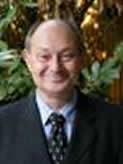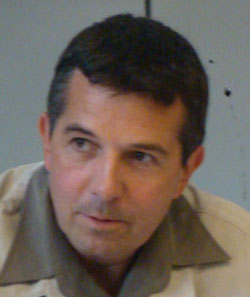Bruno Roussel and Brian Van der Horst

Brian van der Horst

Bruno Roussel
At the Unversity of Toulouse in the South of France, a new organization called Rosace (the French word for those huge rose-shaped stained-glass windows in cathedrals) has been founded to consult and orient those earning integral doctorates to actually finding gainful employment in the real world.
In France, they often call integral studies “transdisciplinary” as you may have read in various past ILR articles about Basarab Nicolescu (http://basarab-nicolescu.fr/chart.php#en) , Edgar Morin, and The International Center for Transdisciplinary Research (CIRET) which has been going full steam http://ciret-transdisciplinarity.org/index_en.php since 1989!
Here’s a description of Rosace’s mission and activities by Bruno Roussel, their founder and current CEO.
“Rosace is an organization offering seminars, consulting, employment counselling and a professional’s directory for those doctoral candidates and graduates that want to work with transdisciplinary methods and tools. This organisation emerged subsequently to an audit of the Paul Sabatier University and research analysis on professional integration (1). Despite the numerous trainings that students undergo in their way to the PhD they are not performing well on the job market, indicating that those training courses are not correctly calibrated. Thus ROSACE was born in 2010 at the confluence several disparate disciplines offering a multiplicity of knowledge bases including: computer science, mathematics, biology, physics, chemistry electronics, including their implied combined skills and inter-disciplinary collaborations. But this organisation only gained momentum with the political support of the President of the University Paul Sabatier Bertrand Monthubert and the support of the Vice-President Arnaud Le Padellec.
“Throughout this project, we aimed to offer a thorough structure tuned to the needs of PhD students and Doctors. “ROSACE” initiates creative actions wherein interdisciplinarity is an extremely productive breeding ground for innovation, which can respond quickly to the evolution of the habits and issues of employment.
“Some fundamental aspects of transdisciplanary support:
*A concern for the future of a doctoral student will only be genuine if the student is perceived as a complex personality developing over several years.
*Over time, personality of the doctoral candidate is foremost, a contemporary human being, building itself as a personal story capable of connecting, overtaking and transforming the collective history to which it belongs.
*This transformation is envisioned as a slow process of development: connecting the dots regarding the progression of personal learning from the moment when personal and professional skills can be mobilized through the support of sponsoring teachers.
“Overall, ROSACE is governed by an ethical philosophy of concern for self and others (Ricoeur) and the construction of meaning. Active construction of meaning and a posture of personal and social responsibility are clearly the tools to generate a social space for the future doctor of philosophy.
“Addressing the complexity of a person supposes working on teaching methods apprehending the complexity of life in general. In this context, separating work areas, as well as the different facets of the personality of the doctoral student, would be synonymous with reductionism.
“Transdisciplinarity is being present in dialogue as the natural confluence of value carrying civilizations.
“It is important that when facing new challenges, doctoral students can create their own paths and modalities of learning, and be able to choose appropriate elements and frames of mind.
“This architecture has attributes of the transdisciplinary paradigm and demonstrates its teachers and researchers’ underlying humanism. The teachers-students team thus puts into application years of work and research in the fields of adult learning, ethical communication and the socio-economics of the founding ideas of European culture and work.
“ROSACE is still in deployment phase, several actions have been undertaken to diffuse about its existence to companies and the primary target, research labs. As for today, 250 doctors and students evolve permanently in ROSACE and we number 80 interacting companies and 15 partner labs spread over 9 countries.”
About the Authors
Bruno Roussel is the Project Director of the “Orientation and Integration Program for PhD students and graduates” of the Paul Sabatier University, He is also Head of the “ROSACE” Engineering degree in Computer Science, Humanities and Social Sciences, in the areas of Strategic Management and Organizational Consulting. Having served as a Public Information and Communications Officer for a large industrial group, he joined the University of Picardie as “Head of Mission for Formation Ouverte et A Distance” (open distance learning) for the implementation and deployment of the “Computing and Internet Certificate” in France and abroad.
Roussel joined Paul Sabatier University in 2009 as head of personalized support for PhD students and Doctors of the university for increasing employability and job search success. He is also a lecturer in the areas of digital, relational, cultural and intercultural communication and management, coordinating the certification of “Professional engineer” in the Masters Engineering Curriculum. His research focuses on human behavior, and the emergence of cognitive processes and mechanical design. He is a member of the European Society of Culture, and the Legal Hermeneutics Circle where he deals mainly with issues related to copyright protection of digital works.
http://rosace.univ-tlse3.fr/
Brian van der Horst is Associate Editor and Bureau Chief for France, Integral Leadership Review. See: http://integralleadershipreview.com/1360-bureau-chief-france/
Note
1 L’INSERTION DES DOCTORANTS, UNE DEMARCHE EN CLAIR-OBSCUR
Bruno Roussel*, Claudia Sapta**, Daniel Marquie Université Paul Sabatier Toulouse 3 – UPS ; **UPS et Université de Picardie Jules Verne (UPJV) – IUTA
